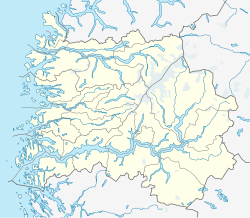Gulen Church
| Gulen Church | |
|---|---|
| Gulen kyrkje | |

View of the church
|
|
| 60°58′51″N 5°04′33″E / 60.9807°N 5.0757°ECoordinates: 60°58′51″N 5°04′33″E / 60.9807°N 5.0757°E | |
| Location |
Gulen Municipality, Sogn og Fjordane |
| Country | Norway |
| Denomination | Church of Norway |
| Churchmanship | Evangelical Lutheran |
| Architecture | |
| Status | Parish church |
| Functional status | Active |
| Architect(s) | Georg Andreas Bull |
| Completed | 1863 |
| Specifications | |
| Capacity | 700 |
| Materials | Wood |
| Administration | |
| Parish | Gulen |
| Deanery | Nordhordland prosti |
| Diocese | Diocese of Bjørgvin |
Gulen Church (Norwegian: Gulen kyrkje) is a parish church in Gulen Municipality in Sogn og Fjordane county, Norway. It is located in the village of Eivindvik. The church is part of the Gulen parish in the Nordhordland deanery in the Diocese of Bjørgvin. The white, wooden church, which has 700 seats, was consecrated on 13 December 1863 by the local Dean Thomas Erichsen. The architect Georg Andreas Bull made the designs.
Eivindvik is regarded as a very old church site, perhaps one of the oldest in the country. The two stone crosses which stands close to the church is over a thousand years old. This is probably where the first Christians in the area gathered, until they built themselves a church. The present church is built on top of the same site as all the previous buildings. Gulen Church was built while the parish is still named Evindvig, and for that reason the church was originally called Evindvig Church. The church name was changed to Gulen Church in 1890. The church stands on a hill in central Eivindvik, with magnificent views towards the Gulafjorden.
The Vicar Niels Griis Alstrup Dahl (1778–1852) was an avid proponent of building a new church in Eivindvik and worked extensively towards that goal. When he died in 1852, the reaction of many in the community was that it important to build the new church to pay tribute to the memory of Dahl. The local council send the government an application to build a church that seats 700 people. In 1860, a royal decree was handed down that gave the municipality permission to build a church of that size. The municipal council then resolved that the ground work should be performed by compulsory work with crews of six men daily, two days per landowning farmer and one day per farm worker.
...
Wikipedia


